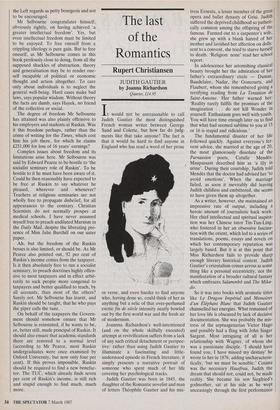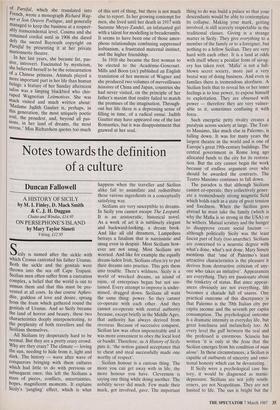The last of the Romantics
Rupert Christiansen
JUDITH GAUTIER by Joanna Richardson
Quartet, £14.95
It would not be unreasonable to call Judith Gautier the most distinguished French woman writer between George Sand and Colette, but how far do judg- ments like that take anyone? The fact is that it would be hard to find anyone in England who has read a word of her prose or verse, and even harder to find anyone who, having done so, could think of her as anything but a relic of that over-perfumed exotic fin de siecle intensity neatly bowled out by the first world war and the fresh air of modernism.
Joannna Richardson's well-intentioned (and on the whole skilfully executed) attempt at revivification suffers from a lack of any such critical detachment or perspec- tive: rather than using Judith Gautier to illuminate a fascinating and little- understood episode in French literature, it simply presents a narrative portrait of someone who spent much of her life covering her psychological tracks.
Judith Gautier was born in 1845, the daughter of the Romantic novelist and man of letters Theophile Gautier and his mis- tress Ernesta, a lesser member of the great opera and ballet dynasty of Grisi. Judith suffered the deprived childhood so patheti- cally common among the offspring of the famous. Farmed out to a carpenter's wife, she grew up with a blank hatred of her mother and lavished her affection on dolls: sent to a convent, she tried to starve herself to death. 'Religion: none' read her school report. In adolescence her astonishing classical beauty brought her the admiration of her father's extraordinary circle — Dumas, Baudelaire, Nadar, the Goncourts, and Flaubert, whom she remembered giving a terrifying reading from La Tentation de Saint-Antoine. Her father warned her: `Reality rarely fulfils the promises of the imagination . . . do not kill Wonder in yourself. Enthusiasm goes well with youth. You will have time enough later on to find that what had seemed sublime to you at 15 or 16 is stupid and ridiculous.'
The fundamental disaster of her life followed quickly. Against everyone's fer- vent advice, she married at the age of 20, the most glamorously dissolute of the Parnassien poets, Catulle Mendes: Maupassant described him as 'a lily in urine'. During their courtship, Judith told Mendes that the doctor had advised her 'to avoid emotions'. When the marriage failed, as soon it inevitably did leaving Judith childless and embittered, she seems to have given them up altogether.
As a writer, however, she maintained an impressive rate of output, including a heroic amount of journalistic hack work. Her chief intellectual and spiritual inspira- tion was her Chinese tutor Tin-Tun-Ling, who fostered in her an obsessive fascina- tion with the orient, which led to a series of translations, poems, essays and novels on which her contemporary reputation was largely based. But it is at this point that Miss Richardson fails to provide sharp enough literary historical context. Judith Gautier's orientalism comes across as some thing like a personal eccentricity, not the manifestation of a broader cultural fantasy which embraces Salammbo and The Mika- do.
So it was into books with aromatic titles like Le Dragon Imperial and Memoires d'un Elephant Blanc that Judith Gautier channelled her energies. What remained of her love life is obscured by lack of decisive documentation. She was probably the mis- tress of the septuagenarian Victor Hugo and possibly had a fling with John Singer Sargent. Most intriguing of all is her relationship with Wagner, of whom she was a passionate disciple. 'I should have found you, I have missed my destiny' he wrote to her in 1876, adding uncharacteris- tically, tut we must be sensible.' Cosima was the necessary Hausfrau, Judith the dream that should not, could not, be made reality. She became his son Siegfried's godmother, sat at his side as he wept unceasingly through the first performance of Parsifal, which she translated into French, wrote a monograph Richard Wag- ner et Son Oeuvre Poetique, and generally managed to keep the business at a respect- ably transcendental level. Cosima and she remained cordial until in 1908 she dared defy the sacred Bayreuth copyright on Parsifal by presenting it at her private marionnette theatre.
In her last years, she became fat, pas- sive, introvert. Fascinated by mysticism, she believed herself to be the reincarnation of a Chinese princess. Animals played a more important part in her life than human beings: a feature of her Sunday afternoon salon was a limping blackbird who chir- ruped Wagnerian Leitmotives. She was much visited and much written about: 'Madame Jtj,dith Gautier is, perhaps, in this generation, the most uniquely poetic soul, the proudest, and, beyond all pas- sions, in her land of dreams, the most serene.' Miss Richardson quotes too much of this sort of thing, but there is not much else to report. In her growing contempt for men, she lived until her death in 1917 with Suzanne Meyer-Zandel, an infatuated girl with a talent for modelling in breadcrumbs. It seems to have been one of those amor- phous relationships combining suppressed lesbianism, a frustrated maternal instinct, and the higher friendship.
In 1910 she became the first woman to be elected to the Academie-Goncourt. Mills and Boon (sic) published an English translation of her memoir of Wagner and she produced two volumes of merveilleuses histoires of China and Japan, countries she had never visited, on the principle of her father's maxim that reality failed to match the promises of the imagination. Through- out her life there is a depressing sense of filling in time, of a radical ennui. Judith Gautier may have appeared one of the last Romantics, but it was disappointment that gnawed at her soul.



























































 Previous page
Previous page